August 31, 2004
8/31 - The real deal on the seal deal in La Jolla?
Who would you rather see having fun on a beach, kids or seals? The residents of La Jolla, California will face this heart wrenching decision on September 14.
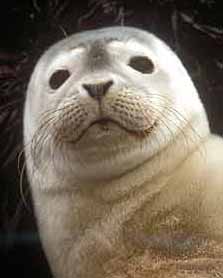
Don't you like me more than your kids?
August 30, 2004
8/30 - Doh, we forgot to pass the law: No striped bass for NJ fishermen?
According to federal legislation, the highly lucrative fall fishing season for striped bass off New Jersey ain't gonna happen this year because they didn't get around to passing the needed laws.
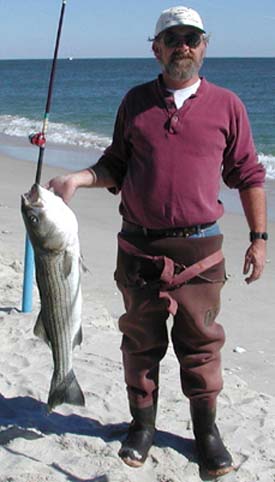
A sight you won't be seeing on the Jersey shore this fall.
8/30 - Environmental Leadership: Don't look to the NY Times (not their job)
So what's the deal -- are we going to drown in an over-population crisis, or do we have this reproduction thing under control? Where do you find the answer to this? I'm not sure, but don't look to media outlets like the NY Times for it -- it's not their job. In yesterday's issue Andrew Revkin slaps a big "MAYBE" on the predictions of over-population.
But aren't we kind of bulging at the seams right now with only 6 billion folks? There seems to be a fairly solid consensus we're headed to 9 billion by 2050. Doesn't that qualify as "a lot more people." The point is that the job of journalists is not to provide guidance, only to report on all the opinions that are out there.

It's the Bjorn Lomborg school of thought.
August 27, 2004
8/27 - The Smoking Pole: Anglers given a share of the blame
There is an age-old disagreement among fishermen as to who bears the blame for over-fishing. Recreational fishermen are fond of claiming their activities are negligible compared to commercial fishermen. But now a new study published in Science magazine yesterday hooks the anglers for almost a quarter of the problem for overfished species. Get ready for a lot of finger pointing.
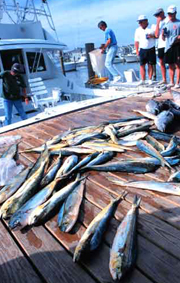
Decked: Recreational fishermen won't like this one.
August 26, 2004
8/26 - Shifting Baselines at Lake Powell: dam the natives, we want trout
Lake Powell on the Colorado river shows that freshwater isn't immune to a baseline shift. Prior to the Glen Canyon dam, the water was shallower and warmer--providing a good environment for a variety of fish. With the dam, the water is deeper, cooler and it isn't nearly as hospitable to the native fish species. Edging out the rest of the natives, trout are at the heart of the Lake Powell "blue ribbon" trout fishery.
Some reports, clearly show the current temperature and how it affects the imperiled natives. [Note figure 6 on page 9, showing the fish species, their spawning & incubation water temperatures and the current temperature.]
Rather than have diversity, there is trout. Soon to be "just trout." For future
fishers, they will probably consider this a pristine trout fishery. Just like it is a pristine "house boat destination."
Maybe not "shifted baselines" but more like "baselines run amok."
8/26 - The Brilliance of Lewis Black on The Daily Show
With our Nettracker software we are able to see every day where people visiting our site were referred from. And when people find their way to our site through a search, it lists what they searched. Since posting an item on August 16 about Lewis Black's rant on The Daily Show about "Keep False Hope Alive," we've had about 20 visitors come to our site from searching, "Lewis Black False Hope." Which is rather extraordinary (though we get 500 to 1000 visitors a day, only a few come from searches).
Clearly he touched a nerve with that rant. So I found the full text of it, which is truly brilliant and extremely relevant to our times since so much of our perceptions of nature today as being "a wild and unknownable place" are based on this same sort of false hope. People don't want to accept it. David Helvarg's landmark book, "The Blue Frontier," urged everyone to make peace with the fact that there is no more blue frontier -- its time to shift gears and figure out how to make life work on a tiny planet. But people just don't want to let go
of "their dreams."
Anyhow, here it is. Nice job Lewis Black, you madman.
"But let's be honest, there is nothing more American than false hope. False hope of making 200k is why people who should know better vote Republican. False hope is why the stock market broke 10,000. False hope is why our natural resources will never run out. False hope is why Iraq will become the democratic linchpin of the Middle east. Keep false hope alive!"
"And another thing that makes me mad ..." Lewis Black at work.
August 25, 2004
8/25 - Fire Safety Tip: Eat Salmon
A recent study of farmed salmon in the American Journal of Environmental Science and Technology reports high levels of PBDEs which are "chemical fire retardants." Uh-kay ... let's add this one to this year's nominations for the Rotten Jellyfish Awards. The Canadian government says, "Anh, a little PDBE won't hurt ya."

Denzel should have eaten his farmed salmon.
8/25 - Good time to be a soft coral: Acid oceans may make skeletons weak
Guess it only makes sense. More carbon into the atmosphere, more carbon dioxide absorbed in the oceans, more acidic oceans, harder it is for creatures to build skeletons. Yeeks.
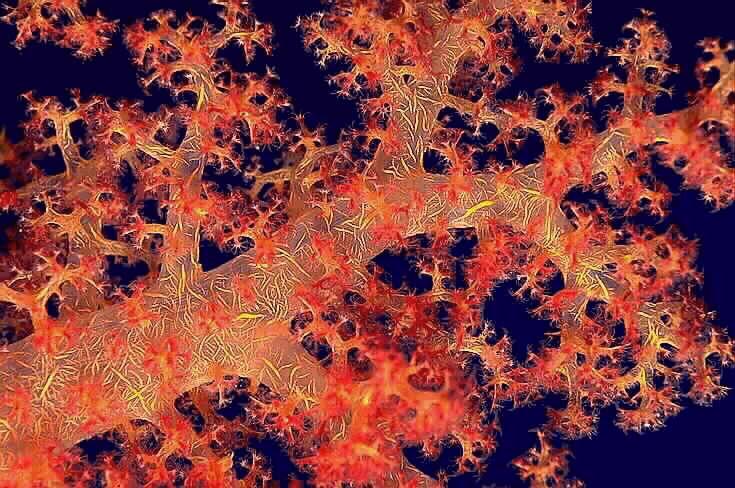
Cry of the Soft Corals: "Ha, we waited 50 million years for this!"
August 24, 2004
8/24 - SB in Utah: accepting polluted air
In the same way that the public learns to adjust to and accept closed beaches, in Utah we are beginning to accept and adjust to polluted air. Rather than protest in outrage, the public is accepting the state's recommendations to stay inside.

What happened to the clear, endless vistas the pioneers saw?
8/24 - MILESTONE: One Millionth "Let's Save the Oceans" OpEd published!
The Washington Post published what is believed to be the this past weekend one millionth OpEd saying the oceans are in bad shape. OpEd readers and writers around the country are now busily e-mailing it to each other with the attached comment, "This'll show 'em."
Saving the Oceans
Sunday, August 22, 2004; Page B06
OVER THE PAST year and a half, two blue-ribbon panels -- the Pew Oceans Commission and the U.S. Commission on Ocean Policy -- have put together major reports on the state of America's coastal waters. The reports, broadly speaking, agree on a depressing reality: This country's oceans are in trouble and absent dramatic policy changes will be irreversibly damaged. Both groups make extensive recommendations for averting such a catastrophe, which would both devastate major economic interests and constitute a fundamental betrayal of society's stewardship of its natural treasures. Over the past century this country has developed a commitment to preserving forest and desert wilderness, protecting air quality and safeguarding land-based species. The message of the two commissions is that policymakers must show a similar commitment to America's territorial waters, which comprise an area larger than the land mass of the United States.
Fortunately, some policymakers are stepping up to the plate. In the wake of the reports, legislation has been introduced in Congress to begin implementing their recom- mendations. Two bills are particularly important. The first is the "Oceans 21" bill introduced by the bipartisan co-chairs of the Oceans Caucus in the House of Representatives (Republicans James C. Greenwood and Curt Weldon of Pennsylvania and Democrats Sam Farr of California and Tom Allen of Maine). The bill seeks to implement many of the recommendations of the U.S. Commission on Ocean Policy, whose final report relating to governance of oceans issues will be delivered soon. Federal authority over oceans is a regulatory mishmash. The bill would set, for the first time, clear national policy on the subject and endow federal institutions with the power to implement it, focusing not on individual species or isolated environmental problems but on oceanic ecosystems.
The second is legislation introduced by Rep. Nick J. Rahall (D-W.Va.) and Mr. Farr to reform the regional management councils that determine how many fish can be taken from American waters and who gets what portion of the allowable catch. Some of these councils are more effective than others in protecting habitats, but the councils tend to be dominated by fishing interests. Their members are not bound by normal conflict-of-interest rules, and they do not always follow scientific analyses in setting limits. The bill would begin correcting these problems. Most important, it would tether conservation decisions more closely to the best available science regarding ecosystem health and separate these conservation decisions from those about allocating the catch.
President Bush, who has been largely silent on the subject, is obliged by law to respond to the Ocean Commission report. He should treat these issues with a seriousness he has not often shown on environmental matters. The threat to the oceans -- and to countless species threatened by overfishing, pollution, nutrient and chemical runoff, and invasive species -- represents one of the most pressing ecological crises of our time. It cannot wait much longer for leadership.
August 23, 2004
8/23 - CALIFORNIA: Step by Step with Governor Schwarzenegger
The story of Governor Arnold Schwarzenegger and the California coast continues. To read THE FOUR STEPS OF GOVERNOR SCHWARZENEGGER'S OCEAN ACTIONS (SO FAR) click on the link at the very bottom of this post...
On Friday the state held a public hearing on the Governor's Action Plan where I showed the two PSAs (Ocean Symphony and Tiny Fish) and spoke briefly (quoted in an article about the hearing in the LA Times Saturday). The hearing was one of those great experiences of representatives from all the major ocean conservation groups working together, saying the same things, supporting each other. And the state officials seemed to be listening closely. When you see that happen you think there just might be hope for the oceans (as opposed to when you hear the marketing and communications people from the major groups talking about how their organization is your "one stop shopping place" for saving the environment).

Would you trust this man with your ocean?
THE FOUR STEPS OF GOVERNOR SCHWARZENEGGER'S OCEAN ACTION (SO FAR)
This is just my take on what I've seen so far, but it looks like it has gone from seemingly bad to what actually looks fairly promising.
STEP 1: The Governator Steps on the MLPA - soon after taking office the new Governor announced he was cutting the $2 million in the state budget slated for implementation of the Marine Life Protection Act (which had been passed in 1999). This brought cries of disappointment from the environmental groups, and from the general public, it brought ... a collective yawn (on the list of priorities for this state, the oceans appear to be pretty far down).
STEP 2: Governor Schwarzenegger Appoints Terry Taminen head of Cal. EPA - Terry Taminen is a long time, dyed in the wool environmentalist, and as a result was chided by friends when he took the position. I heard him speak at a luncheon in May and was almost shocked at his praise for the Governor's commitment to environmental leadership. I began to have doubts about the initial knee-jerk revulsion by the left over Schwarzenegger's election.
STEP 3: Scripps Press Conference - in June, Jeremy Jackson and I attended a short press conference beside the Scripps Pier at which Terry Taminen and Mike Crisman (head of Cal. Natural Resources Dept.) spoke about the Governor's determination to establish California as a leader in ocean conservation. Being a couple of veteran skeptics, we both scowled and did our best to look like non-believers, but in truth we were pretty impressed with the things we heard (provided they come true).
STEP 4: Governor's Ocean Action Plan - last week the Governor's office held public hearings on Thursday in San Francisco and Friday in Newport Beach to gather comments on the Governor's new Ocean Action Plan. I attended the Newport Beach session, presided over by Terry Taminen and Brian Baird who is the long time Ocean Program Manager (the Governor's main guy on the oceans who has served with three governors). About 35 people spoke (including me) and I have to say, it sure looks to me like they are very serious about actually protecting the oceans rather than just talking. What was my first clue? That so many of the people testifying were irked that they were being given so little time. Apparently the Governor had told his staff, "Let's set a date and get
this thing going." I think that's a good signal at this point. Yes, it's important to be inclusive of everyone, but sometimes when things are so far behind schedule (the MLPA was passed in 1999 and has yet to be implemented), somebody needs to take the reigns and just make it happen. (And think about what a weak leader would do -- probably give every single person lots and lots of time to say everything until the whole issues loses its momentum).
I'm coming close to being a believer that this Governor actually means what he is saying about wanting California to be a model for ocean protection. There could be some very constructive times ahead. We'll see.
8/23 - Alvin Takes a Dive: Famous submersible headed for retirement
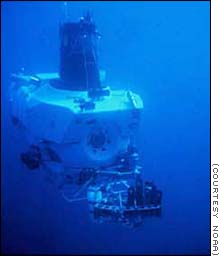
Deep sea veteran: the research submersible Alvin.
Christened in 1964. Wow. Forty years of diving two miles down. Quite a career.
August 20, 2004
8/20 - Attack of the Giant Echizen Jellyfish!
Check this out -- video of jellyfish that are a meter in diameter and attacking Japan. Yeeks. They can weigh up to 150 kg.
8/20 - Seppo Nightmare: The Chesapeake Bay chokes again
Australians are fond of calling Americans "Seppos," which is short for "septic tanks," which kind of rhymes with "yanks" in their twisted little minds. According to waterman Elmer Evans, of Smith Island, "That's what the Chesapeake Bay is now, a big septic tank." So if the Gulf of Mexico is the toilet of America, and the Chesapeake Bay is the septic tank, what does that make San Francisco Bay?
Probably not a laughing matter for people of Maryland and Northern Virginia. It's that time of year again when the No Oxygen zone ominously slides beneath the waters of the Chesapeake Bay, suffocating all the marine life in its path. "It rolls in like a fog," Evans says. Over the past 20 years its become a regular phenomenon which keeps getting worse. Here is an excellent in-depth article in the Washington Post that tells of the widespread frustration with the sad state of the Bay (you must register to read the full article or see an exerpt below).

Elmer Evans feels like a true blue Seppo.
Bay's 'Bad Water' Churns Unease
Summer's Low-Oxygen Zones Leave Sea Life, Locals at a Loss
By David A. Fahrenthold
Washington Post Staff Writer
Monday, August 16, 2004; Page B01
NEAR POINT NO POINT, CHESAPEAKE BAY -- The bad water shifts like fog under the surface.
Some days, there's no sign of it in this shallow part of the bay off St. Mary's County, where Buddy Evans puts out his pots to catch blue crabs. Other days, he pulls up the pots and finds all the crabs dead inside.
"It's just like a fog. It rolls in, it rolls out," said Evans, a 37-year-old waterman from Smith Island.
What Evans and others call "bad water" has been robbed by algae of its dissolved oxygen, which fish and crabs need to breathe. Scientists blame man-made pollutants -- animal manure, suburban lawn-care products and treated sewage -- that act like underwater fertilizer for the algae.
For 20 years, this kind of pollution has been recognized as the most pervasive of the Chesapeake's many troubles. But years of effort to curb it has made little change: Last summer, when heat and high rainfall made the algae bloom heavily, about 40 percent of bay water lacked adequate oxygen, according to the Environmental Protection Agency's Chesapeake Bay Program.
The season for bad water has come again. And in one recent week, a tour of the bay and its tributaries revealed a tide of frustration.
Aug. 2: University of Maryland
Robert J. Diaz, a professor at the Virginia Institute of Marine Science, was talking to a room of scientists gathered for a dissolved-oxygen conference. His presentation included one slide that summed up the day's message: "When you can't breathe, nothing else matters."
"Humans have not screwed up any other measurement" of the Chesapeake's health, Diaz told the group, "as much as oxygen."
The process of oxygen depletion starts in the bay's tributaries, including the Potomac, Severn and Susquehanna rivers, the scientists said. Rain washes animal manure and lawn fertilizer into creeks and rivers, and sewage plants dump treated waste. Even air pollution, released by power plants hundreds of miles away, can land on the water.
Through those kinds of pollution, the water absorbs large amounts of nitrogen and phosphorus. These nutrients feed algae blooms that choke off light to underwater grasses. And when the algae die, they decompose in a way that consumes large amounts of dissolved oxygen.
The result is bad water. How much of it depends on rainfall; in a dry year such as 2002, less runoff occurs, and the algae decline. The bad water is more common in the deep channels of the middle bay, scientists said, where it doesn't mix with oxygen from the air. But winds or water currents can move it into shallower areas where crabs and fish are plentiful.
Because the bad water doesn't stay in one solid mass, scientists at this gathering said they don't like the term "dead zone" -- used by the private Chesapeake Bay Foundation to describe the low-oxygen areas.
In addition, they said, bad water isn't always dead: In some areas, there is enough oxygen for more resilient species such as crabs and oysters to survive.
"It's sort of like you and I going up to the top of Mount Everest," said Rich Batiuk of the Chesapeake Bay Program. "We can survive up there. But darn, it's hard to breathe."
August 19, 2004
8/19 - Not a place for Jerry Garcia fans: Oregon's newly discovered Dead Zone
Oregon has decided to join Louisiana in having its own "dead zone." This one may or may not be human caused. It's not from river effluent like the one in the Gulf of Mexico (Rotten Jellyfish #10), but is instead from the welling up of deep water that is lacking in oxygen. Why this water is coming up from the depths remains the subject of study. Regardless, if you get enough dead zones in the oceans, then one day the ocean will be...dead.
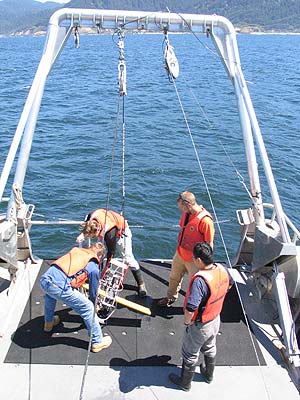
8/19 - Underwater Crescendo: the noise vs. whales conflict is building
Its been a busy year for those trying to give whales some peace and quiet. Our partner group Seaflow is tracking the impact on whales of Navy sound tests, the Ocean Mammal Institute is putting together a petition to the U.N. about undersea noise pollution, and even the Russians have allocated $2 million to look at the problem for grey whales.
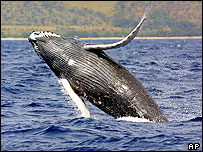
A whale tries to escape its noisy habitat.
August 18, 2004
8/18 - Shifting Frickin' Baselines: NRDC beach report shows once again the public adjusting to closed beaches
What's the relevance of "shifting baselines" to the average person? Beach closures for starters. NRDC has released its annual report on beach water quality revealing "another record breaking year!". As in the wrong kind of record to break. Beach closure days exceeded 18,000, a 51% increase from 2002.
And there were how many protests of beach closures? That, my friends, is "shifting baselines," when the public readjusts their beach-going habitats to find the beaches that are open and bypasses the dirty ones rather than demand their clean-up.
August 17, 2004
8/17 - Arrr, matey: Fishing pirates plague Australian fisheries
Australians say vessels from Russia, Uruguay, and Spain, "... haven't been as proactive as we would like them to be." Which presumably is a roundabout way of saying they are plundering the seas for seafood booty.

8/17 - Wagga, wagga, wagga: PACman enters the oceans
The oceans have their first Political Action Committee! Organized by Jack Sterne and David Wilmot, co-authors of the "Turning the Tide" report for the Packard Foundation, which, among other things, pointed out that ocean conservationists are far better with policy than politics. Truer words have never been spoken.
August 16, 2004
8/16 - Special Oceans Issue of U.S. News & World Report: "Keep False Hope Alive"
What does this cover say to you about the oceans?
Last week on The Daily Show with Jon Stewart, Lewis Black had a great segment in which he talked about what he thought should be America's
new slogan, "Keep False Hope Alive." Which is brilliant. And very
applicable to this week's special issue of U.S. News and World Report,
which is dedicated to the oceans ... kinda. Or maybe it's a little
more dedicated to trying to sell the maximum number of copies using the oceans as a hook. On the cover is a photo of a mean looking shark with the title, "Mysteries of the Oceans: How new discoveries under the seas are shaping our future."
What's so bad about this? To begin with, let's be honest and admit
that in today's minimal-reading society, the headline is 90% of what
gets communicated. The actual text of the article is like the fine
print on a contract which nobody reads. Yes, the people who actually
buy the magazine may read it, but they are few in number compared to
how many glance at the cover on the newsstand.
So let's look at it this way -- try to imagine doing a special issue
about a 28 year old Olympic athlete who is dying of throat cancer, and
putting a healthy photo of her on the cover with the title, "Going for
the Gold: Mysteries of an Olympic hero," with no mention of her
disease. Would that seem right?
And then someone contacts the magazine and says, "Don't you think that
her dying is a fairly major part of the story?" And they reply, "Well,
you and I know that, but we don't want to depress our readers -- death
doesn't sell copies -- people want to keep false hope alive. But hey,
look at the article itself, you'll see we have little inset boxes
titled 'Athletes in Peril' in which we tell tidbits about her
disease."
Which is the deal with the US News oceans special issue -- when you
read the articles you see they have a series of inset boxes titled,
"Oceans in Peril." Kind of like the fine print, so they can say that
technically they gave a nod to the fact that their feature subject is,
by the way, oh yeah, dying.
Who's to blame in this distorted communication? The writer? He or she
will tell you its the editor's fault. The editor? He or she will tell
you its the public's fault (they don't want bad news). The public?
They will tell you that if they knew this was THE major story about the
oceans today (that they are dying) they would expect it on the cover,
which is true. So it tracks back to one of two things -- either the
oceans aren't dying, or the fact that they are dying is not being
communicated to the general public effectively.
Regarding the former point, one of the "Oceans in Peril" boxes in the
US News article says, verbatim, "Two thirds of the world's coral reefs
are dying." That alone is enough reason to go with the general
statement that the oceans are dying (which is further supported by
declining world fisheries, emerging dead zones, etc.)
As for the latter point, yes, the idea of the oceans dying has not been
communicated effectively. How else can a movie like, "Finding Nemo,"
be set on a healthy, vibrant coral reef when U.S. News says that 2/3 of
them are dying? (and be packed with hundreds of healthy sea turtles --
see our Rotten Jellyfish Awards).
There's only one explanation, and Lewis Black hit it on the head last
week. "Keep False Hope Alive." There's lots of money to be made with
that as a motto. Which is okay, but as Michael Moore is so effectively
pointing out today (as he shames virtually all American journalists for
their failure to ask tough questions), don't look to the mass media for
leadership -- it ain't there.
August 13, 2004
8/13 - He Did It! Paul Ellis completes his 35 mile "Swim for the Reefs"
![PaulEllis[1] (2).jpg](http://shiftingbaselines.org/blog/images/PaulEllis[1] (2).jpg)
Austin businessman Paul Ellis calls attention to coral reef decline
with his 35 mile swim in Cozumel, Mexico.
After getting knocked back two years ago at 11 miles, Austin businessman Paul Ellis returned to Cozumel, Mexico on August 5 and completed the entire 16 hour, 35 mile swim to call attention to the plight of coral reefs.
Click here to view Paul's official website.
8/13 - Planetary Coral Reef Foundation's satellite: At least someone is capable of looking to the future
As everyone scratches away with the hyper-urgent, "We want results HERE AND NOW!" mantra, at least one group has patiently set themselves on a 20 year course that is designed to work towards long-term solutions. The Planetary Coral Reef Foundation has been slowly, meticulously advancing a plan (along with M.I.T., Scripps, and several other fine institutions) to launch a satellite dedicated entirely to monitoring the health of coral reefs around the world.
Check out the press release they envision for Spring, 2011:
The Coral Reef Satellite Mission (CRSM) was launched in 2009 and is circling our planet, transmitting real-time data about the state of the world’s coral reefs back to Earth daily. The ‘eye in the sky’ is performing beautifully, exactly as MIT’s Center for Space Research designed. The Science Operations Center at Scripps Institution of Oceanography has just completed the first global baseline map of coral reefs. People around the world are logging on to www.pcrf.org , downloading data and images for free, discovering the hidden world of coral reefs and witnessing the changes in their health and vitality.
Stay tuned, it's happening.
![pcrflogo[2] (2).jpg](http://shiftingbaselines.org/blog/images/pcrflogo[2] (2).jpg)
8/13 - Biting Back: Sharks, tired of our pollution, are now attacking us
Remember Daniele Gaither giving the #1 Rotten Jellyfish Award to shark fin fishing and saying, "No wonder sharks are attacking surfers." She was joking, but now sharks may actually be attacking more humans because of what we've done to them.
In the Gulf of Mexico, the BBC reports that we've so thoroughly spoiled their waters they are being forced into areas of higher human density.

Choke the sharks and how do you expect them to respond?
August 12, 2004
8/12 - Australia vs. California Fishing Lobbies: Who’s in charge?
How is it Australia is able to proclaim one third of the entire Great Barrier Reef to be a “no-fishing” zone, but in Monterey, California even the hint of constraining fishing is met with alarms about “red tape.” I think a lot of people around Monterey wonder what the term “sanctuary” means when it has no effect on fishing impact.
From The Monterey Herald: The sanctuary was established in 1992 and is meant to protect the ecosystem of 5,322 square miles of ocean, mostly in Monterey Bay. Fishermen said they agreed to support the designation of Monterey Bay as a "sanctuary" after being assured by then-Rep. Leon Panetta and others that the resulting agency would not try to impose limits … on fishing.
August 11, 2004
8/11 - WHAT TO EAT: The Definitive Word for SEAFOOD
For the past few years there have been grumbles about discrepancies between seafood choice lists. Now, at last, THE FISH LIST provides the clear, simple consensus.
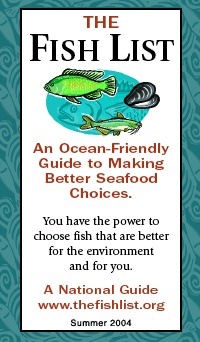
August 10, 2004
8/10 - Batten the Hatches: It's El Nino time again
Cue the rains, floods, droughts, wildfires, time moving backwards, matter changing state randomly, and dogs including cats in their poker games. El Nino is coming again this fall.
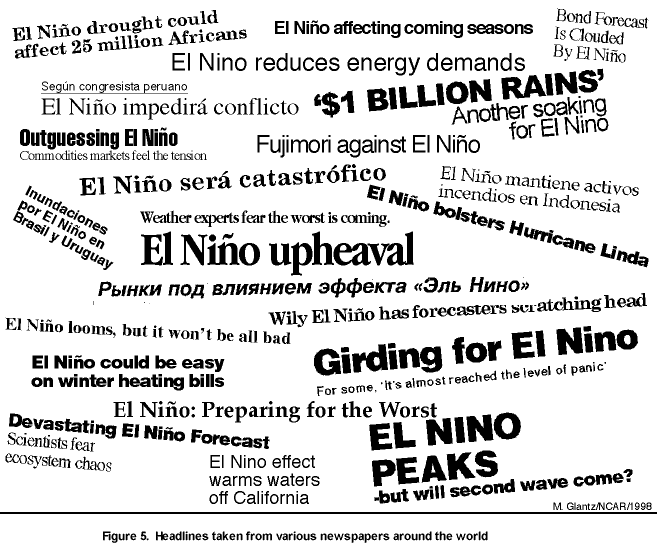
8/10 - Paving Paradise in Alaska for Progress
Many people consider Alaska's wilderness as the last great "pristine" area left in the United States. However, those who live there and wish to develop the lands they inhabit have a different perspective.
Doug Isaacson, a businessman in North Pole, does not understand why environmentalists in the continental United States are inhibiting progress in Alaska. He sees the protection of the Alaskan frontier by outsiders as "immoral" and "absolutely wrong." To him, protecting hundreds of millions of acres from any development whatsoever is a baseline set far too high.
It's true that those who live in metropolitan areas are often strong advocates for the protection of pristine areas. But, perhaps their motive is not so much a wish to have a quiet and empty place to visit, but rather that they know far to well the damage that can result due to excessive development.
While the earth may be "God's bounty" for us to use, at some point if we manage our global resources poorly, we will find ourselves at the bottom of the chest.
- Sage Lichtenwalner (sage@marine.usf.edu)
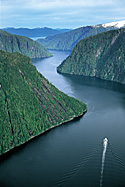

What's your baseline?
8/10 - Accosting the Brick Wall: OpEd after OpEd after OpEd for the oceans.



I think OpEd readers of America are pretty much ready to cry uncle on the oceans issue. Last week saw yet another wave of OpEds (NY Times, Washington Post, Monterey Herald) about the dire state of the oceans. There have been literally hundreds of OpEds about the oceans published over the past two years (including mine for Shifting Baselines). And how many television commercials?
Would it make sense for a political candidate to direct all of his or her resources towards print media instead of television? Even Sam Donaldson, being interviewed by Ali G, conceded, "we live in a television society - if it's not on television it's not an issue."
Why so many OpEds? Is it like being the nerd on the playground and yelling at your nerd friends instead of trying to confront the bully?
August 09, 2004
8/9 - The Way We Weren't: John D. MacDonald's take on SB in Florida
The nice thing about "shifting baselines" is that there are many different ways to convey it. Here's how John D. MacDonald described it for Florida in his novel, "The Empty Copper Sea":
Florida can never really come to grips with saving the environment because a very large percentage of the population at any given time just got there. So why should they fight to turn the clock back? It looks great to them the way it is. Two years later, as they are beginning to feel uneasy, a few thousand more people are just discovering it all for the first time and wouldn't change a thing. And meanwhile the people who knew what it was like twenty years ago are an ever-dwindling minority, a voice too faint to be heard.
- Mike Boone, Boonedocks Blog
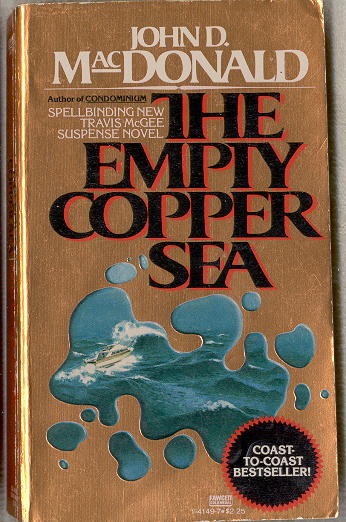
8/9 - Where's Teddy when we need him?
A 21st-century president can do for the oceans what Roosevelt did on land. This weekend, Fred Krupp, president of Environmental Defense, and Peter Benchley, author of Jaws, ask Bush and Kerry to do just that.
8/9 - Bland Ambition: Are PSAs as bad as election commercials?
This is an excellent article last month in The Atlantic Monthly about the lousiness of election campaign commercials titled, “Dumb and Dumber.” The basic message: television commercials for products (beer, computers, cell phones) value innovation, but television commercials for election candidates value blandness.
It presents some great numbers, like the trend towards packing more information into election ads over the years. And guess what, the “teachable moment”-motivated Democrats are 5 times worse than the Republicans – “from 1952 to 1996 the average number of issues covered in Republican ads rose by 115 percent, and in Democratic ads by a kamikaze 519 percent.” Stupid, stupid Democrats. Well intentioned, but just can’t help themselves.
The overall pattern: “Over time, political ads have become more confusing, shorter, and more malevolent,” with the last part referring to negative advertising. More importantly, they have just numbed the public into disinterest. Kind of like ocean conservation. Information is a powerful resource with both the power to stimulate and the power to bore.
August 07, 2004
8/7 - Back from the Grave: The California MLPA (Marine Life Protection Act)
Here is an update on the MLPA process -- looks like the pressure put on the State House has helped keep the MLPA alive (along with private foundation dollars to help pay for it)...but not without some political tug of wars.
August 06, 2004
8/6 - U.N. Helps Further Fractionate Ocean Conservation Efforts
How many gazillion ocean conservation campaigns can one planet support? UNEP announced last week its new initiative, called Earthdive, which, among many objectives, will include monitoring of coral reefs. But I thought Reef Check was doing that. And Reef Relief. And the Coral Reef Alliance. And the Ocean Conservancy. And ...
Sorry, I'm just echoing the sentiments that we heard at our Roundtable evening last January -- the general feeling that, "there are so many groups doing so many activities that seem so repetitious and over-lapping, you just don't know who to support." It's a genuine problem -- maybe just a communications problem, but definitely a problem. The public is not wrong on this. You can hear the sound bites in the video of our Roundtable event on our FILMS & PSAs page.
Not saying that we have any better answers, just noting that its a problem. Personally I think that David Helvarg's efforts at trying to unify ocean conservation into a single "Seaweed Rebellion" is the right direction. But how many of these groups really want to follow someone else's lead?
8/6 - The Seafood King says, "We want people to think about their seafood, where it comes from"
Executive Chef John Besh of Louisiana was crowned Seafood King today at the Great American Seafood Cook-off. The culinary event extraordinaire in New Orleans was all about domestic seafood. Gold crown in hand, Besh talked with excited Food Channel producers, trade journal editors, and local media.

Food for thought: seafood
August 04, 2004
8/4 - Lobster Hunters Beware: Granny's Got a Gun
Some lobster tails aren't worth chasing.
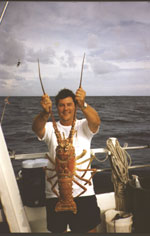
X-treme Lobster Hunting
August 03, 2004
8/3 - MPAs 7: New Zealand creates its largest marine reserve
The Government's conservation agency is forging ahead with a contentious marine reserve that will quadruple the Hauraki Gulf's no-fishing area.
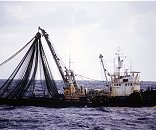
New Zealand: Bravely going where Americans fear.
August 02, 2004
8/2 - SB PHOTO CONTEST RESULTS: The drama of coral decline
Today we announced the results of our little experiment called, "The Shifting Baselines Photo and Caption Contest," which we pulled together rather quickly with little knowledge of how to run a contest other than what we knew from last year's Comedy Contest. It turned out great, with nearly 100 submissions from 18 countries.
The first thing we had to do, as submissions started coming in, was add the, "...and Caption ..." bit. Some people were just sending in random diving photos that had nothing to do with S.B. But as soon as we did that, everyone seemed to get the message and the submissions started getting very interesting and illustrative of ocean decline. Still not sure how many of them illustrate "shifting baselines" exactly, if you consider that SB basically means the failure to notice change. But that's okay. It also means lowered standards, and ocean decline in general is an aspect of this.
What is most interesting is that the five judges, who spanned a fairly wide range of professions (from photographer to scientist to television producer) were in very close agreement in their choices. The first two places were at the top of almost all of their lists and were thus way ahead of the rest of the pack. Which means they opted a bit more for substance over style since neither of the sets of coral photos are particularly artsy. I think the judges were all just deeply moved by the whole idea of losing beautiful coral reefs.
For us, the two top choices are great. For over a year we have been holding up our coral reef lenticular images as the trademark of our project. Now, at last, we have before/after images from real coral reefs that show what we're talking about. They don't include the fish, but the coral heads they show are very long-lived making their death all the more dramatic.
Overall, the contest was a great success and clearly prompted a lot of people to do a lot of deep thinking about ocean decline. We received some great e-mails and saw some great comments about it on a number of internet forums and chatrooms. We're interested to hear your thoughts on the winners, and we're already starting to think about running the contest again next year but on a larger scale with a few more months of submission time. We'll let you know if we do.
Thanks for taking part.
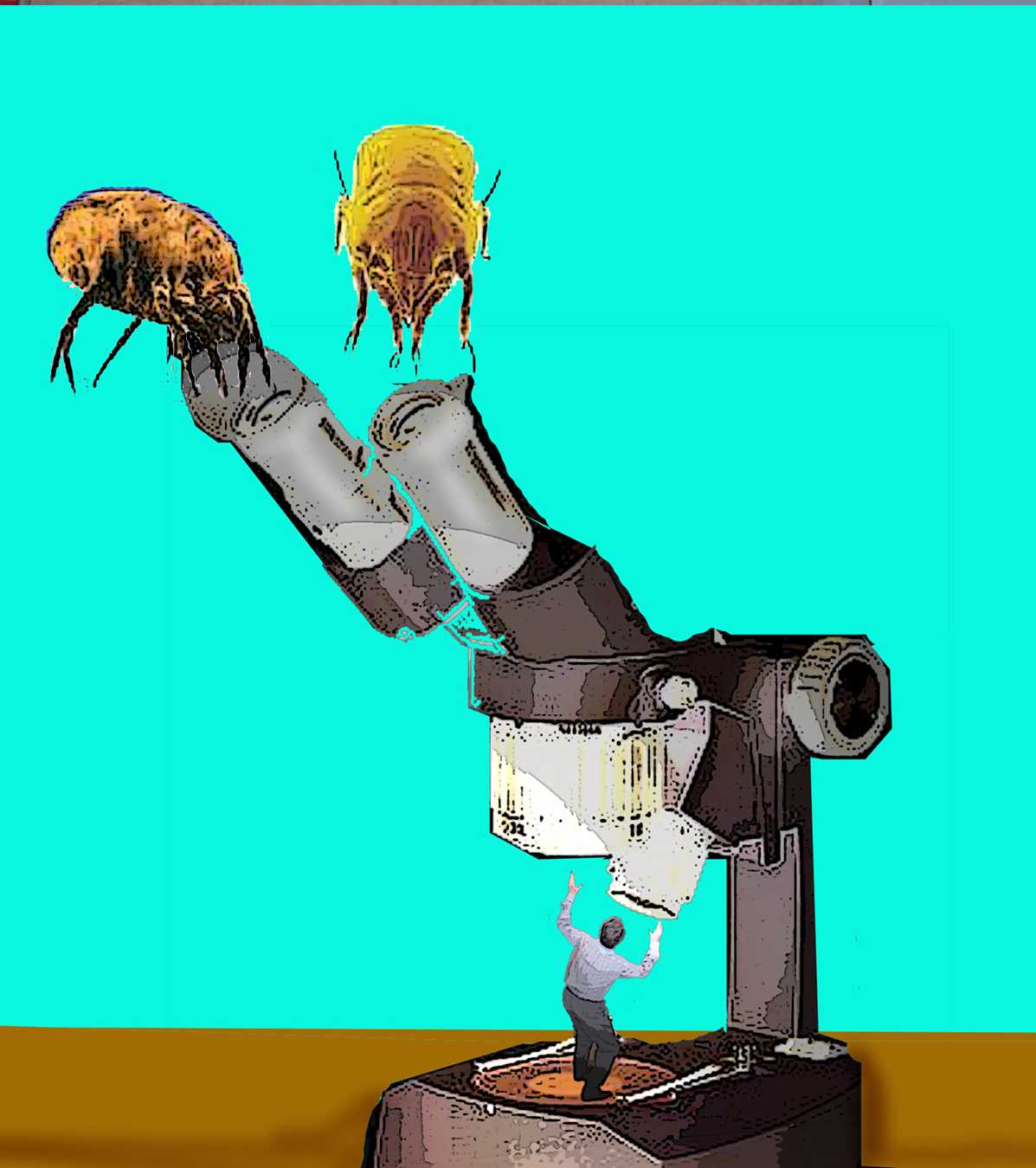
Personally, this was my favorite submission, but for some reason it
didn't make the Finalists (from Sona Sandalian of Laredo, Tx.)
8/2 - And off to your left you'll see the lovely oil spill we've created for your viewing pleasure
The captain of an eco-tour ship told me about one time in Antarctica when he awoke in the early morning to the ship going much slower than it should. Confused, he walked to the bow and looked over and saw, to his horror, that they were pushing the body of a dead humpback whale they must have rammed during the night. He said they quickly, quietly, reversed engines and slipped away from the carcass without any of the passengers discovering.
Sometimes eco-touring doesn't quite go right, which was the case in Alaska this past weekend.
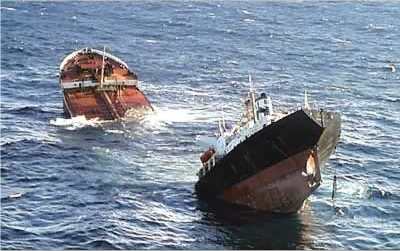
A slick version of eco-touring

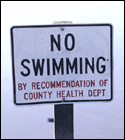
![pacman[1].GIF](http://shiftingbaselines.org/blog/images/pacman[1].GIF)
![current_cover[1].GIF](http://shiftingbaselines.org/blog/images/current_cover[1].GIF)
